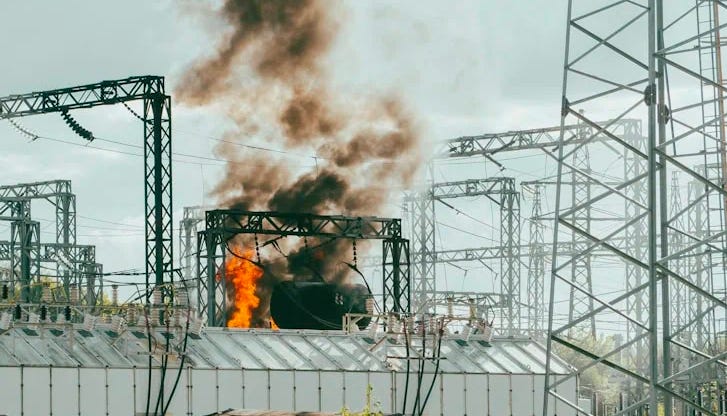Imagine waking up to silence—no hum of appliances, no flicker of lights, no buzz of notifications.
The power grid is down, and it’s not coming back anytime soon.
Whether it’s a cyberattack, a natural disaster, or an infrastructure failure, a grid collapse can flip your world upside down in hours.

The first 72 hours are critical—chaos can unfold fast, but with the right mindset and prep, you can weather the storm.
Here’s what might happen and what you need to think about if the lights go out tomorrow.
Thanks for reading ON SURVIVAL! Subscribe for free to receive new posts and support my work.
The First 72 Hours: What to Expect
Hour 1-6: Confusion Sets In
Most people won’t realize the scope of the outage right away. Phones might still work on battery power, but cell towers could start failing as backup generators run dry.
ATMs, credit card machines, and gas pumps will go dark—cash becomes king, if you can even find a store still open.
Traffic lights die, snarling roads as folks scramble home or to stock up. If it’s cold, homes begin to chill; if it’s hot, the heat creeps in fast.
Hour 6-24: Panic Takes Hold
By now, the reality hits: this isn’t a quick fix.
Grocery shelves empty as people hoard what’s left—think toilet paper frenzy, but worse. Without refrigeration, perishable food spoils.
Water pressure drops if treatment plants lose power, and sanitation falters as pumps fail. Hospitals strain under generator limits, and pharmacies shut down.
Rumors fly—social media, if it’s still up, becomes a mess of fear and speculation.
Hour 24-72: Survival Mode Kicks In
Day two brings desperation. Fuel runs scarce—generators sputter out, and cars line up at dry pumps.
Communication crumbles as batteries die and internet access fades. Looters might emerge, targeting homes or stores.
If you’re in a city, noise and tension rise; in rural areas, isolation deepens. Hunger sets in for the unprepared, and tempers flare over the last scraps.
By day three, it’s clear: you’re on your own until order creeps back.
What to Think About and Prepare For
Power Alternatives
You’ll need light and heat (or cooling, depending on the season).
Stock flashlights, candles, and matches—LED lanterns with extra batteries are gold. A small solar charger can keep your phone or radio alive.
If you’ve got a generator, ration fuel; a full tank won’t last long.
Water is Life
No power often means no clean water. Aim for one gallon per person per day—three days is 12 gallons for a family of four.
Fill bathtubs and jugs if you get a heads-up.
Have a filter or purification tablets; boiling water needs fuel you might not have.
Food That Lasts
Stock non-perishables: canned goods, peanut butter, rice, jerky—stuff that doesn’t need cooking if possible.
A camp stove with propane can help, but ventilation matters indoors.
Eat fridge stuff first, freezer next—keep doors shut to stretch the cold.
Cash and Barter
Digital payments vanish in a grid-down scenario.
Keep small bills stashed—$100-$200 could get you far when others can’t pay.
Think barter too: extra batteries, booze, or smokes might trade better than gold.
Safety First
Darkness invites trouble.
Lock doors, keep lights low to avoid attention, and know your neighbors—alliances beat isolation.
A basic weapon (legal where you are) isn’t a bad idea, but don’t flash it unless you mean it.
Sanitation Plan
Toilets stop flushing without water pressure.
Line them with trash bags or dig a latrine if you’ve got yard space.
Stock wipes, sanitizer, and garbage bags—disease spreads fast when hygiene tanks.
Mindset Matters
Panic kills plans. Stay calm, assess, adapt.
Kids and pets need extra care—keep them busy and fed. Info might be spotty, so a battery-powered radio (tuned to emergency channels) beats waiting for news that won’t come.
The Bottom Line
If the grid drops tomorrow, the first 72 hours test your foresight and grit. It’s not just about stuff—it’s about thinking ahead.
Can you stay warm, hydrated, and fed? Can you avoid the chaos?
Prep now: a few bucks and a weekend can mean the difference between scrambling and surviving.
The grid’s a fragile beast—don’t bet on it always being there.
Thanks for reading ON SURVIVAL! Subscribe for free to receive new posts and support my work.
